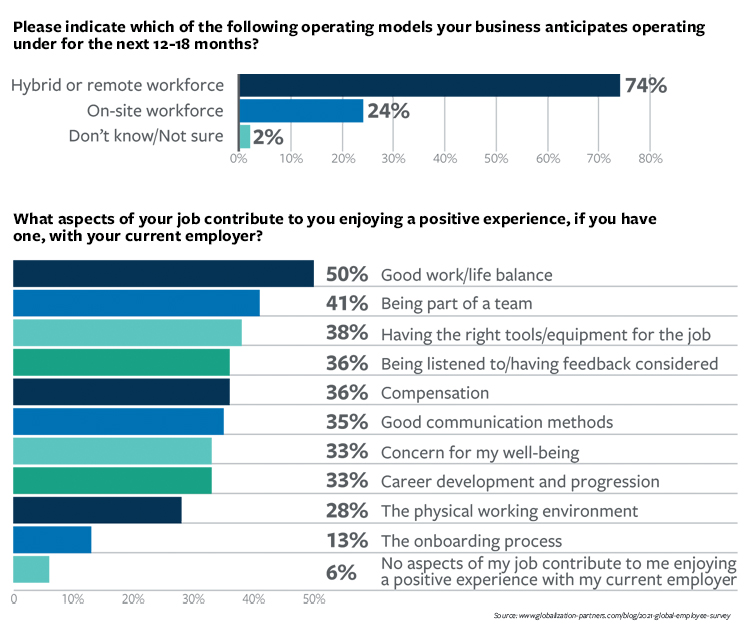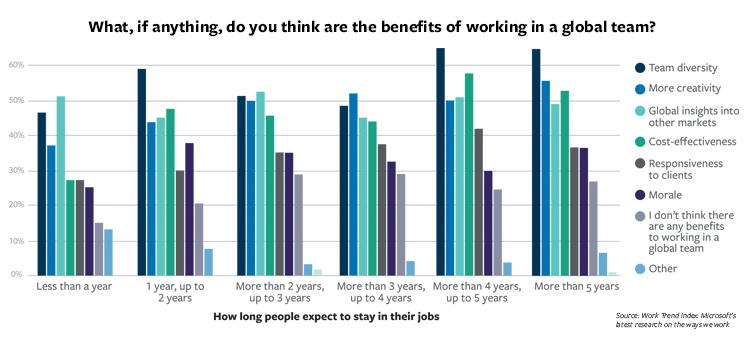How To Leverage Remote Hiring for Employee Retention
Remote hiring has become crucial to ensure talent retention, and research shows that decision-makers are now embracing it as a strategy.

This article is sponsored by Globalization Partners. It originally appeared in the 2022 Guide to Dealmaking. Read the full report in the archive.
In 2020, companies were forced into remote work to reduce the effects of the pandemic. Supported by online tools, companies around the world adopted this new system with the purpose of reducing the health risks of Covid-19, but it also had an unexpected result: a better work-life balance for millions of employees. Now, people are willing to quit their jobs and look for one that does not require them to go to a physical office. In this scenario, remote hiring has become crucial to ensure talent retention.
According to a survey by CFO Research of Industry Drive and Globalization Partners, decision makers understand the relevance of remote hiring and think it is a way to achieve success. The poll included 215 finance executives in North America, the Asia-Pacific region (APAC), as well as Europe, the Middle East, and Africa (EMEA). Statistics showed that CFOs were optimistic about their results for 2021; 93 percent believed that their companies would meet or exceed their goals and expectations.

Perhaps the reason for this optimism is the global positive perception of the work-from-anywhere model and the new possibilities afforded by remote hiring.
The coronavirus pandemic was a breaking point that cleared many experts’ doubts. Seventy-five percent of the CFOs polled affirmed that this worldwide crisis altered the way they thought about hiring and workforce management. Additionally, 81 percent changed their point of view about remote employees for the better, and 74 percent anticipate operating under a hybrid or remote model during the upcoming year. Thanks to this paradigm shift, companies started tapping into a global talent pool, accessing employees everywhere in the world. Eighty-five percent considered hiring talent with the appropriate skills in more cost-effective jurisdictions to be of interest to them and to their company’s key stakeholders.
The Great Resignation
What began as a temporary solution became not only a viable permanent option but also a new way of management. The effects of remote hiring on work experience inspired a movement called “The Great Resignation.” Employees are quitting their jobs and looking for places where they can keep working remotely. According to the U.S. Department of Labor, in April, May, and June, a total of 11.5 million workers quit their jobs.
This is supported by the recent Work Trend Index by Microsoft which showed that more than 40 percent of the global workforce desired to leave their current job during 2021. Companies have been taking advantage of remote work to hire talent anywhere in the world, but those planning to return to the office must find ways to keep hold of that talent.
As stated in The 2021 Global Employee Survey, conducted by Globalization Partners, the way people feel towards their jobs changed after the transition to remote work in 2020. This research gives in-depth insights into employees’ sentiments toward their remote work environment, their intention to stay in their current roles, and their overall job satisfaction.

Improved perception of employers
The changes adopted by companies during the pandemic had a positive effect on the perception employees had toward their jobs. According to the global employee survey results, 48 percent of employees felt happier since they started working remotely, and 34 percent sensed that their voices mattered more in the company.
Surprisingly, compensation was not in the top three factors that contribute to a better work experience globally. The first aspect was a better work-life balance, followed by being part of a team, and having the right tools/equipment for the job. Workers realized, after a year at home, the value of wellbeing— and employees want to hang onto this learning. Companies that understand how their workforce feels about their work-life balance can enhance talent retention.
Diverse teams nurture retention
According to those surveyed, diversity is the main advantage of remote work. This has a direct correlation with talent retention: 58 percent feel that diversity is the most important benefit of global teams, followed by more creativity (51 percent), and global insights into other markets (49 percent). Moreover, people who plan to stay in their current job for more than four years declared that diversity was the main advantage of their team. It’s no coincidence that teamwork and the ability to express opinions influence people to keep their current positions.
Happiness with the reporting line also correlates with retention: 44 percent stated that their perception of company leadership improved in the last year. From this group, 50 percent plan to stay at their companies for more than three years. Retention can be promoted by leadership – by setting goals and objectives that encourage healthy work habits, and empowering middle management to do the same.
Leaders’ ability to steer their teams through a crisis correlates strongly with employee loyalty. In fact, response to the Covid-19 pandemic significantly impacted teams’ loyalty towards those in charge, suggesting that transparency is more valuable than appearing calm and collected. At times when they perceive their leader stretched and stressed, and seeing how stress is handled among leadership, workers become either more convinced of their loyalty or more set in their unhappiness with current leadership.
Retention boosts opportunities
Diversity and leadership build up employees’ trust, but other findings signaled different areas of opportunity that, if tapped into, can boost talent retention. For example, 32 percent of the employees surveyed felt less connected to their coworkers. The three biggest challenges global teams face are scheduling across time zones, process speed, and lacking communication methods. We can surmise that technology plays a key role in connecting people in different countries—if done in an efficient and nonintrusive way, employees will be more likely to report happiness and, therefore, stay longer in their roles.
One thing that both surveys clearly revealed, when interviewing employees as much as CFOs, is that remote hiring is not the future; it is our present. Companies that understand this shift and adapt will have a competitive advantage in employee retention. But the message from the workforce is clear: A healthy work-life balance is more important than compensation. If that means that employees need to quit their jobs and find a new remote role, they will.
Companies that listen to their employees and take measures to value their global teams, and keep them connected and happy, will see a boost in their productivity— motivating their talent to continue working for them.


